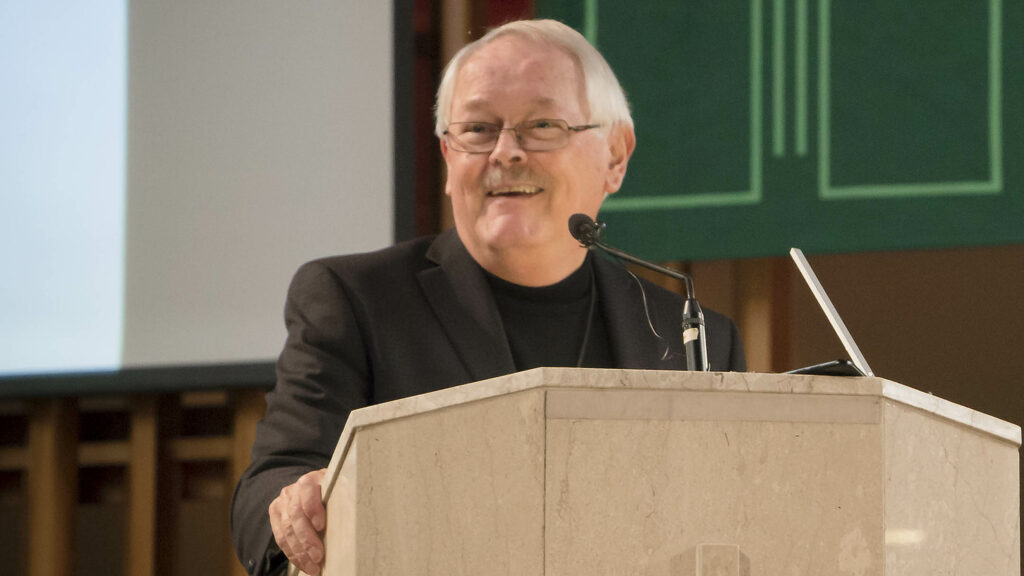Simone Weil once commented that it’s not enough today to be merely a saint; rather “we must have the saintliness demanded by the present moment.”
She’s surely right on that second premise; we need saints whose virtues speak to the times.
What kind of saint is needed today? Someone who can show us how we can actually forgive an enemy? Someone who can help us come together across the bitter divide within our communities and churches? Someone who can show us how to reach out to the poor? Someone who can teach us how to actually pray? Someone who can show us how to find “Sabbath” inside the bombardment of ten thousand television channels, a million blogs, and a billion tweets? Someone who can show us how to sustain our childhood faith amidst the sophistication, complexity, and agnosticism of our adult lives? Someone who, like Jesus, can go into singles’ bars and not sin? Someone who radiates a full-bodied humanity, even as he or she is, by faith, set apart? Someone who’s a mystic, but with a robust sense of humor? Someone who can be both chaste and healthily sexual at the same time?
The list could go on. We’re in pioneer territory. The saints of old didn’t face our issues. They had their own demons to conquer and aren’t rolling over in their graves, shaking their fingers in disgust at us in our struggles and infidelities. They know the struggle, know that ours is new territory with new demons to conquer and new virtues asked for. The saints of old remain, of course, as essential templates of Christian discipleship, living gospels, but they walked in different times.
So what kind of saints do we need today?
We need saints who can honor the goodness of the world, even as they honor God. We need women and men who can show us how to walk with a living faith inside a culture which believes that world here is enough and that the issues of God and the next life are peripheral. We need saints who can walk with a steady, adult faith in the face of the world’s sophistication, its pathological restlessness, its over-stimulated grandiosity, its numbing distractions, and its overpowering temptations. We need saints who can empathize with those who have drifted away from the church, even as they themselves, without compromise, hold their own moral and religious ground. We need young saints who can romantically re-enflame the religious imagination of the world, as once did Francis and Clare. And we need old saints, who have walked the gamut and can show us how to meet all the challenges of today and yet retain our childhood faith.
As well, we need what Sarah Coakley calls “erotic saints”, women and men who can bring chastity and eros together in a way that speaks of the importance of both. We need saints who can model for us the goodness of sexuality, who can delight in its human joys and honor its God-given place within the spiritual journey, even as they never denigrate it by setting it against spirituality or cheapen it by making it simply another form of recreation.
Then too we need saints today who can, with compassion, help us to see our blind complicity with systems of all kinds which victimize the vulnerable in order to safeguard our own comfort, security, and historical privilege. We need saints who can speak prophetically for the poor, for the environment, for women, for refugees, for those with inadequate access to medical care and education, and for all who are stigmatized because of race, color, or creed. We need saints, lonely prophets, who can stand as unanimity-minus one, and who can wage peace and who can point our eyes to a reality beyond our own shortsightedness.
And these saints need not be formally canonized; their lives need simply be lamps for our eyes and leaven for our lives. I don’t know who your present-day saints are, but I find have found mine among a very wide range of persons, old, young, Catholic, Protestant, Evangelical, liberal, conservative, religious, lay, clerical, secular, faith-filled, and agnostic. Full disclosure, the names I mention here are not persons whose lives I know in any detail. Mostly, I know what they’ve written, but their writings are a lamp which lights my path.
Among those of my own generation, I’m indebted to are Raymond E. Brown, Charles Taylor, Daniel Berrigan, Jean Vanier, Mary Jo Leddy, Henri Nouwen, Thomas Keating, Jim Wallis, Richard Rohr, Elizabeth Johnson, Parker Palmer, Barbara Brown Taylor, Wendy Wright, Gerhard Lohfink, Kathleen Dowling Singh, Jim Forest, John Shea, James Hillman, Thomas Moore, and Marilynne Robinson.
Among the younger voices whose lives and writings speak as well to a generation younger than mine, I would mention Shane Claiborne, Rachel Held Evans, James Martin, Kerry Weber, Trevor Herriot, Macy Halford, Robert Barron, Bryan Stevenson, Robert Ellsberg, Bieke Vandekerckhove, and Annie Riggs.
Maybe these aren’t your saints, fair enough. So lean on those who help light your path.

